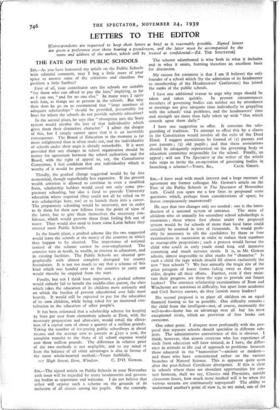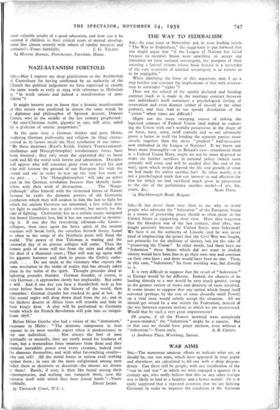LETTERS TO THE EDITOR
(Correspondents are requested to keep their letters as brief as is reasonably possible. Signed letters are given a preference over those bearing a pseudonym, and the latter must be accompanied by the name and address of the author, which will be treated as confidential.—Ed. THE SPECTATOR]
THE FATE OF THE PUBLIC SCHOOLS Sut,—As you have honoured my article on the Public Schools with editorial comment, may I beg a little more of your space to answer some of the criticisms and elucidate the problem a little further?
First of all, your contributor says the schools are suitable "for those who can afford to pay the fees," implying, as far as I can see, " and for no one else." In many ways I agree with him, as things are at present in the schools. But why then does he go on to recommend that " large numbers of adequate scholarships " should be provided, presumably for boys for whom the schools do not provide suitable education?
In the second place, he says that " absorption into the State system would involve the loss of that individuality which gives them their distinctive character." I admit the danger of this, but I simply cannot agree that it is an inevitable consequence. The Board of Education at the moment is far more enlightened than is often made out, and the individuality of schools under their aegis is already remarkable. If it were provided that any changes in school organisation should be matter for agreement between the school authorities and the Board, with the right of appeal to, say, the Consultative Committee, I feel confident that any individuality which is worthy of it would be preserved.
Thirdly, the gradual change suggested would be far less economical, though superficially less expensive. If the present wealth criterion is allowed to continue in even a modified form, scholarship holders would need not only some pre- paratory schooling, but also a fund to provide University education where required (they could not all be relied on to win scholarships here, too) or to launch them into a career. The preparatory schooling would be necessary, not in order to fit them for their new fellows from the point of view of the latter, but to give them themselves the necessary con- fidence, which would prevent them from feeling fish out of water. They would also need to learn some Latin before they entered most Public Schools.
In the fourth place, a gradual scheme like the one suggested would leave the schools at the mercy of the counties in which they happen to be situated. The importance of national control of the scheme cannot be over-emphasised. The counties vary in needs, in wealth, in interest in education, and in existing facilities. The Public Schools are situated geo- graphically with almost complete disregard for county boundaries. It is not too much to say that a scheme of this kind which was handed over to the counties to carry out would thereby be crippled from the start.
Finally, but not I think least important, a gradual scheme would entirely fail to benefit the middle-class parent, the class which takes the education of its children most seriously and on which the burden of present educational cost falls most heavily. It would still be expected to pay for the education of its own children, while being asked for an increased con- tribution to the education of other people's.
It has been estimated that a scholarship scheme for keeping 25 boys per year from elementary schools at Eton, with the necessary preparation and after-care, would entail the alloca- tion of a capital sum of about a quarter of a million pounds. Taking the number of fee-paying public schoolboys at about 20,000, and the average cost to parents at £150 a year, the complete transfer to the State of all school expense would cost three million pounds. The difference in relative price of the two methods is not negligible, and to my mind at least the balance of all other advantages is also in favour of the more whole-hearted method.—Yours faithfully, 117 High Street, Eton, Windsor. C. D'O. GOWAN.
Sia,—The signed article on Public Schools in your November nth issue will be regarded by many headmasters and govern- ing bodies as opportune and welcome. I do not believe that either will oppose such a scheme on the grounds of its inclusion of all classes among the pupils. On the contrary.
The scheme adumbrated is wise both in what it includes and in what it omits, forming therefore an excellent basis for discussion.
My excuse for comment is that I am (I believe) the only founder of a school which (by the admission of its headmaster to membership of the Headmasters' Conference) has joined the ranks of the public schools.
I have one additional reason to urge why steps should be taken and taken quickly. In present circumstances members of governing bodies can neither act by attendance at meetings nor give adequate time individually to grappling with the schools' vital problems, and the headmasters' time and strength are more than fully taken up with " that which cometh upon them daily."
I have one suggestion to offer. It concerns the safe- guarding of tradition. To attempt to effect this by a clause in the Constitution would involve all the evils of the Dead Hand. I suggest associations be formed of (t) parents and past parents ; (2) old pupils ; and that these associations should be adequately represented on the governing body or education committee responsible for the school. Finally, an appeal ; will not The Spectator or the writer of the article take steps to invite the co-operation of governing bodies in
launching a scheme?—Yours, &c., CECIL GRANT.
Sta,—I have read with much interest and a large measure of agreement my former colleague Mr. Gowan's article on the Fate of the Public Schools in The Spectator of November roth. Could you spare me a few lines to propound some questions which, perhaps from considerations of space, he leaves conspicuously unanswered?
He says that two changes only are needed : one is the intro- duction of a national system of entrance. The mass of children who sit annually for secondary school scholarships is enormous ; those whose first choice under the proposed system would be for schools of more than local fame could certainly be counted in tens of thousands. It would prob- ably be necessary to sift the candidates by three or four examinations in succession in order to reduce their numbers to manageable proportions ; such a process. would favour the child who could in early youth stand long and intensive cramming and much nervous strain. It is, as Mr. Gowan admits, almost impossible to allot marks for " character." Is such a child the type which should fill almost exclusively the new " best schools "? We face annually the tragic rite of the prize paragons of lower forms fading away as they grow older, despite all their efforts. Further, even if they main- tain their progress, are these the type to provide our fugue leaders? The entrance scholarship examinations of Eton and Winchester are notorious in difficulty, but apart from academic and Civil Service careers, do they furnish many leaders?
His second proposal is to place all children on an equal financial footing so far as possible. One difficulty remains ; the child from the intelligent—not, of course, necessarily the well-to-do—home has an advantage over all but his most exceptional rivals, which no provision of free books can overcome.
One other point. I disagree most profoundly with the pro- posal that separate schools should specialise in different sub- jects. The administrative convenience of this is obvious. I think, however, that almost everyone who has experience of sixth form education will have noticed, as I have, the differ- ence in attitude to life and of approach to problems between those educated in the " humanities "—ancient or modern— and those who have concentrated rather on the various branches of Natural Science. This is apparent quite soon after the post-School Certificate divergence. If this is clear in schools where there are abundant opportunities for con- tact between, shall we say, Classics and Physicists, outside classroom hours, how much more marked will it be when the various streams are continuously segregated? The ability to understand another's point of view is, to my mind, one of the
most valuable results of a good education, and how can it be secured if children in their critical years of mental develop- ment live almost entirely with others of similar interests and





































 Previous page
Previous page